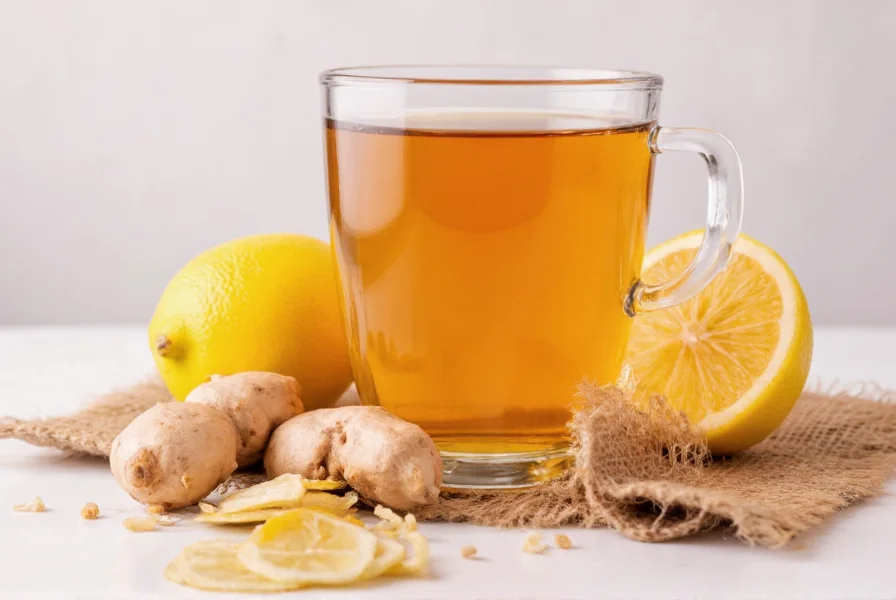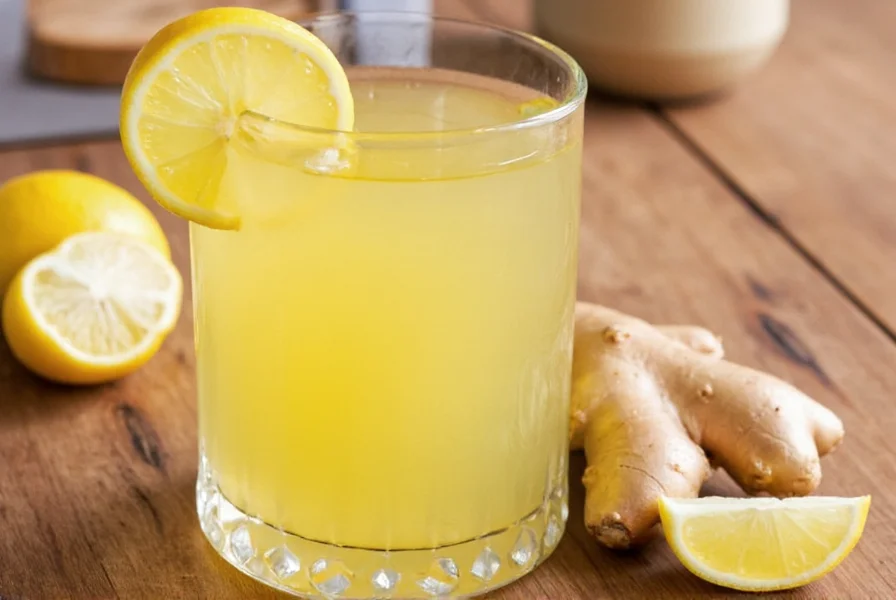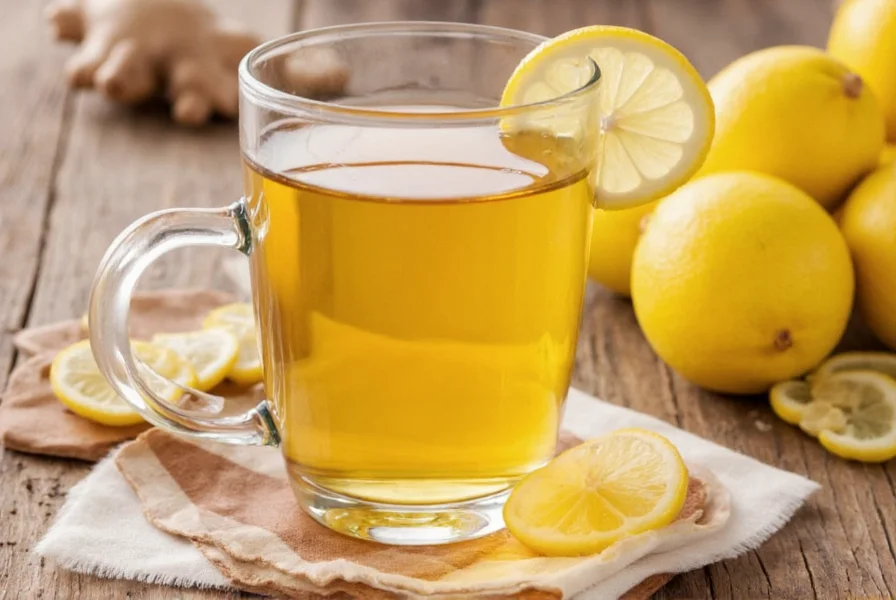Ginger lemon tea has been cherished across cultures for centuries as a comforting, health-promoting beverage. This simple combination of two powerful natural ingredients creates a synergistic effect that provides both immediate sensory pleasure and potential wellness benefits. Unlike commercial tea blends that often contain additives, pure ginger lemon tea delivers unadulterated goodness from whole food sources.
The Science Behind Ginger Lemon Tea Benefits
Research indicates that ginger contains bioactive compounds like gingerol, which demonstrates significant anti-inflammatory and antioxidant effects. A 2019 review published in Nutrients highlighted ginger's potential role in supporting digestive health and reducing nausea. Lemon contributes vitamin C and flavonoids that may enhance the body's antioxidant defenses. When combined, these ingredients create a beverage with complementary properties that may support overall wellness.
It's important to note that while many people report positive experiences with ginger lemon tea for cold relief and digestion, these effects vary between individuals. The beverage should be viewed as part of a healthy lifestyle rather than a medical treatment. Those with specific health conditions or taking medications should consult healthcare providers before making significant dietary changes.
Nutritional Components Worth Knowing
The power of ginger lemon tea comes from its natural composition. Here's what makes this simple beverage nutritionally valuable:
| Ingredient | Key Components | Potential Benefits |
|---|---|---|
| Ginger root | Gingerols, shogaols, zingerone | Anti-inflammatory, digestive support, nausea reduction |
| Lemon | Vitamin C, flavonoids, citric acid | Antioxidant support, immune function, hydration |
| Hot water | Hydration | Improved circulation, digestion support |
This natural combination creates a beverage that's more than just the sum of its parts. The heat from the water helps extract beneficial compounds from the ginger, while the acidity from lemon may enhance the bioavailability of certain nutrients.
Perfect Ginger Lemon Tea Recipe
Creating authentic ginger lemon tea requires minimal ingredients but attention to preparation details. The how to make ginger lemon tea recipe that delivers optimal flavor and potential benefits follows these steps:
- Peel and thinly slice 1-2 inches of fresh ginger root
- Bring 2 cups of filtered water to a rolling boil
- Add ginger slices and reduce heat to maintain a gentle simmer
- Steep for 10-15 minutes (longer for stronger flavor)
- Remove from heat and add the juice of half a lemon
- Optional: Add a small amount of raw honey after tea has cooled slightly
The ideal steeping time balances flavor intensity with potential benefits—too short yields weak tea, while over-steeping can create excessive bitterness. For the best ginger lemon tea for cold relief, consider adding a pinch of cayenne pepper to enhance circulation.

Optimal Timing for Maximum Benefits
Understanding the best time to drink ginger lemon tea can enhance its potential effects. Many wellness practitioners recommend:
- Morning consumption: Helps stimulate digestion and provides gentle energy without caffeine
- Before meals: May support digestive processes (consume 15-20 minutes prior)
- During cold season: Regular consumption may provide immune support
- Evening relaxation: A milder version can serve as a calming nighttime beverage
Those specifically interested in ginger lemon tea for digestion might benefit from consuming it after meals, though individual responses vary. People using it as part of a wellness routine for ginger lemon tea cold relief often increase frequency when experiencing early symptoms.
Safety Considerations and Potential Side Effects
While generally safe for most people, certain individuals should exercise caution with ginger lemon tea. Understanding potential ginger lemon tea side effects is essential:
- People taking blood thinners should consult doctors before regular consumption
- Those with gallstone issues may need to moderate ginger intake
- Excessive consumption might cause heartburn in sensitive individuals
- Lemon's acidity could potentially affect tooth enamel over time
Pregnant women should discuss ginger consumption with healthcare providers, as recommendations vary based on individual circumstances. As with any dietary change, moderation is key—most experts suggest limiting consumption to 3-4 cups daily for general wellness purposes.

Making Ginger Lemon Tea Part of Your Wellness Routine
Incorporating ginger lemon tea into daily life requires no special equipment or expensive ingredients. The simple ginger lemon tea recipe can be adapted to personal taste preferences while maintaining its fundamental benefits. For those exploring ginger lemon honey tea benefits, remember that adding honey after the tea has cooled slightly preserves more of its natural enzymes.
This beverage works well as part of a holistic approach to wellness, complementing other healthy habits rather than serving as a standalone solution. Its versatility makes it suitable for various seasons and occasions—from a refreshing iced version in summer to a warming hot preparation during colder months.
Frequently Asked Questions
Does ginger lemon tea really help with cold symptoms?
Many people find ginger lemon tea provides symptomatic relief for colds due to its warming properties, hydration benefits, and the potential anti-inflammatory effects of ginger. While it won't cure a cold, it may help soothe sore throats and support the immune system as part of overall cold management.
How often can I safely drink ginger lemon tea?
Most healthy adults can safely enjoy 2-3 cups of ginger lemon tea daily. Those with specific health conditions or taking medications should consult healthcare providers about appropriate consumption levels. Excessive consumption (more than 4 cups daily) might cause digestive discomfort in some individuals.
Can ginger lemon tea help with weight loss?
Ginger lemon tea may support weight management efforts as part of a comprehensive approach. It's calorie-free when consumed without sweeteners and may help with digestion and reducing bloating. However, it's not a weight loss solution on its own and should be combined with proper nutrition and exercise for best results.
When is the best time to drink ginger lemon tea for digestion?
For digestive support, many find benefit from drinking ginger lemon tea 15-20 minutes before meals to stimulate digestive enzymes, or 30 minutes after meals to support digestion. Those with sensitive stomachs might prefer consuming it between meals rather than on an empty stomach.
What's the difference between using fresh versus dried ginger in tea?
Fresh ginger typically contains higher levels of gingerol, the compound responsible for many of ginger's potential benefits. Dried ginger has more shogaol, which forms when gingerol is heated or dried. Fresh ginger generally provides a brighter, more robust flavor and potentially greater bioactive compounds compared to dried ginger powder.











 浙公网安备
33010002000092号
浙公网安备
33010002000092号 浙B2-20120091-4
浙B2-20120091-4